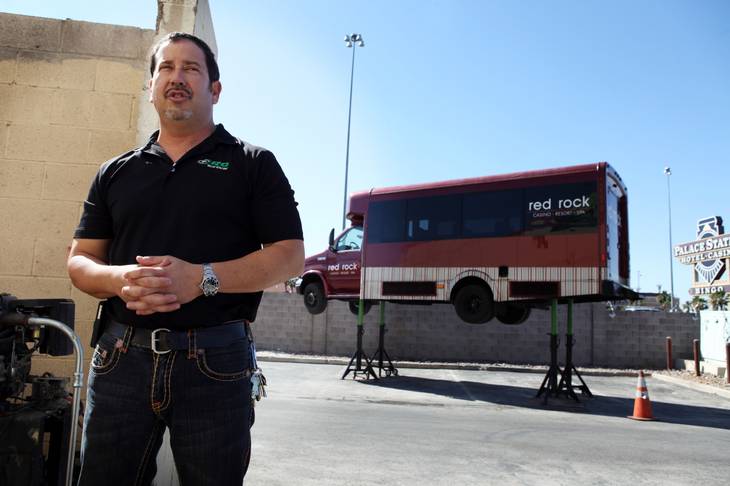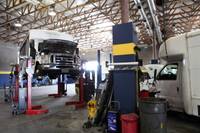Three times a week, RO Truck and Equipment owners Joe Machin and Brian Edwards gathered their 18 employees in the “War Room” to talk about the future.
It was 2006, and the construction industry – their business – was dying.
At the time, RO Truck and Equipment maintained construction fleet vehicles and fabricated equipment for construction companies. But the economy was collapsing; Las Vegas’ construction boom was fizzling. RO’s revenue was dwindling.
Machin and Edwards decided their company needed to make a change to survive.
Business tips
WHAT TO DO IF YOU'RE DOWNSIZING
• Communicate: Immediately tell staff what’s happening and why. Otherwise, a rift could form between workers and management. Employees left in the dark often feel bitter and are less inclined to work hard.
• Sublet large office space: A room full of empty cubicles after layoffs serves as a reminder of uncertainty. Sublet the space or renegotiate your lease. Not only will it help boost staff morale, it will reduce costs.
• Limit unnecessary purchases: There’s nothing worse for employees than watching business owners make frivolous purchases after a round of layoffs. It makes the company appear unsympathetic toward workers.
• Do layoffs all at once: Firing employees in intervals creates more uncertainty among remaining staff. Instead, take the Band-Aid approach and make all layoffs in one round.
WHAT TO DO IF YOU'RE READY TO GROW
• Continue to communicate: Keep an open line of communication with employees. Talk with them about how they can perform better, keep them updated on the company’s health and fill them in on future plans.
• Fill vacant positions: Many companies shrunk to only essential staff during the downturn. Hire back standout employees who fell victim to layoffs or bring in new employees to fill holes.
• Bring back benefits: Reward staff members who remained loyal during tough times. Return benefits that were cut.
So they came up with a new business plan: They backed out of construction and moved into bus repairs.
And again, Machin and Edwards gathered their staff in the war room to talk about the future. They explained the changes the company would undergo. They spoke honestly about the sacrifices they needed to make. They shared the rationale behind their decisions.
They did everything right, experts said.
When a company anticipates a major change – downsizing or an expansion, for instance – the key to a smooth transition is communication with employees, even when the news is bad. It’s up to business owners to be wary of the effect their decisions have on staff.
“Communication is the key,” Machin said. “We’re very transparent. We always share with our staff our vision, and we take input from them. If your staff believes in your leadership, then they’re going to follow you.”
Even as Edwards and Machin cut hours and streamlined inventory to stay afloat, their workers supported them. In fact, Machin said, employees worked even harder to make sure the company survived.
“They were patient,” he said. “We continued to fund their payroll during downtimes, and they got onboard.”
Because staff members knew what was happening, “it wasn’t where everybody was like ‘Oh, my God, we’re going to be out of jobs,’” Machin said. “We knew that was going to be key. The culture was the key to us, as was our staff’s supporting our vision.”
Today, RO Truck is known as RO Bus Sales. The company performs bus fleet maintenance and fabrication for local hotels and senior centers, the Nevada Regional Transportation Commission and companies in Utah and California.
The firm has quadrupled its revenue, outlasted two of its competitors, expanded into a larger building and earned a Small Business of the Year award from the Nevada district of the Small Business Administration.
•••
Employees can tell when a company is struggling to stay afloat.
They notice co-workers walking out with cardboard boxes and take stock of empty cubicles. They feel the burden of heavier workloads and the sting of cut hours and shrinking salaries.
All combine to instill a sense of uncertainty in a workplace, said Dianna Russo, managing principal for the CPA firm Houldsworth, Russo and Company, which offers businesses advice. If left unaddressed, she said, that uncertainty can fester and infect an entire company.
“People are worried: Are they next?” Russo said. “The fear is, ‘Wow, what’s going on? Am I going to lose my job?’”
Jeff Waddoups, a UNLV economics professor who specializes in labor, said employees who remain in companies that are downsizing often end up feeling survivor’s guilt. They begin to wonder why they were spared and if and when their time will come.
“Unemployment is one of those life events that is the most stressful,” Waddoups said. “It causes people to be the most unhappy.”
If employees are asked to take on more work without an explanation about what’s happening and why, they can become resentful or disgruntled, which hurts production.
“What we’ve seen in this recession is wages really sticking,” Waddoups said. “(Because) when workers’ wages are cut, workers get upset, and it really affects productivity.”
•••
When the recession forced Bob Linden to make salary cuts at his document shredding company, Shred-it, his employees accepted it. Linden’s secret was communication. He sat his staff down for regular meetings to discuss the cuts.
At the time, almost a third of Shred-it’s clients had downsized or gone out of business, causing much of the company’s revenue to dry up.
Linden asked staff what they valued most. They said their jobs. So he guaranteed them job safety but explained that cuts would be made somewhere else.
The two-way conversation made it easier for the staff to come to terms with the salary reduction, Linden said.
“They accepted it as a fact of life,” he said. “They know me and know I’m sincere. They said they understood and were glad they had a job. Every single one of them knew somebody who was out of work for long periods of time.”
Machin agreed. He said his meetings helped keep staff morale high and instilled a sense of buy-in among his employees. They continued to work hard because they knew they had a say in the company’s future.
Russo said communication helps to quell resentment and frustrations that can grow during periods of uncertainty. Employees need to know why workers are being laid off and why changes are being made so they can feel confident in their positions. Staff meetings also can prevent rumors and dissension.
“Sometimes people at the top don’t talk to the people at the bottom,” Russo said. “Employees make assumptions that may not be right. That’s where dissension starts.”
Physical space also can play a role in worker morale. Businesses should be aware of their office layout after downsizing.
Rather than have employees work in a half-empty room that reminds them of all the co-workers who have been let go, companies are better off subletting space or renegotiating a lease, Russo said.
•••
Russo’s firm has told more companies they owe money to the IRS this year than it has in six years, since the recession hit.
That’s good news. It means businesses are beginning to become profitable again.
Linden’s company, for instance, is on the upswing. And he’s spreading the joy.
As a reward for his employees’ sacrifices and loyalty, he renegotiated his company’s incentive program. He based the changes on employees’ recommendations.
“They’re loving it,” Linden said. “They’re very happy about the new program we put in place.”
Russo commended Linden for rewarding his staff. She said it makes good business sense to bring back benefits that were cut in a tight economy and fill holes left open during a downturn.
Still, she recommended companies take a conservative approach when growing.
Machin’s company has been so successful, it upgraded to a larger warehouse at 2701 Westwood Drive, near Sahara Avenue.
The outside of the building is deceiving. It looks run-down with cracks and chips, but that is by design.
Machin said the building will get a paint job eventually, but he wants to take care of his employees first.
Inside, RO’s offices are furnished and filled with staff. The walls are freshly painted, the floors are tiled, and the war room’s dry erase boards are marked with notes.
Even in the rebound, Machin continues to hold regular company meetings.




